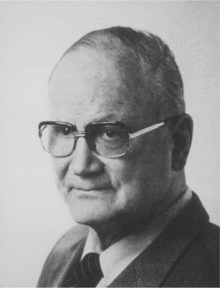Friedrich Wegener

Friedrich Wegener (April 7, 1907, Varel – July 9, 1990, Lübeck) (English /ˈvɛɡənər/) was a German pathologist who is notable for his description of a rare disease now referred to as granulomatosis with polyangiitis. Although this disease was known before Wegener's description, from the 1950s onwards it was generally referred to as Wegener's granulomatosis.[1]
Wegener joined the Nazi Party in 1932.[1] As a relatively high-ranking military physician, he spent some of World War II in a medical office three blocks from the Łódź Ghetto, a Jewish ghetto in Łódź, Poland.[1] There is speculation that he participated in experiments on concentration camp inmates.[1]
The American College of Chest Physicians (ACCP) awarded Wegener a “master clinician” prize in 1989.[1] After his Nazi past was discovered in 2000, the ACCP rescinded the prize and, separately, a campaign was begun to rename Wegener's granulomatosis to ANCA-associated granulomatous vasculitis.[1] More recently, several professional societies proposed the name 'granulomatosis with polyangiitis' in a 2011 editorial.[2]
See also
Further reading
- Woywodt A, Haubitz M, Haller H, Matteson EL (2006). "Wegener's granulomatosis". Lancet. 367 (9519): 1362–6. doi:10.1016/S0140-6736(06)68583-8. PMID 16631915.
- Woywodt A, Matteson EL (2006). "Wegener's granulomatosis--probing the untold past of the man behind the eponym". Rheumatology (Oxford). 45 (10): 1303–6. doi:10.1093/rheumatology/kel258. PMID 16887845.
References
- 1 2 3 4 5 6 Feder, Barnaby J. (2008-01-22). "A Nazi Past Casts a Pall on Name of a Disease". The New York Times.
- ↑ Falk RJ, Gross WL, Guillevin L, Hoffman GS, Jayne DR, Jennette JC, Kallenberg CG, Luqmani R, Mahr AD, Matteson EL, Merkel PA, Specks U, Watts RA (2011). "Granulomatosis with polyangiitis (Wegener's): an alternative name for Wegener's granulomatosis". Arthritis Rheum. 63 (4): 863–4. doi:10.1002/art.30286. PMID 21374588.